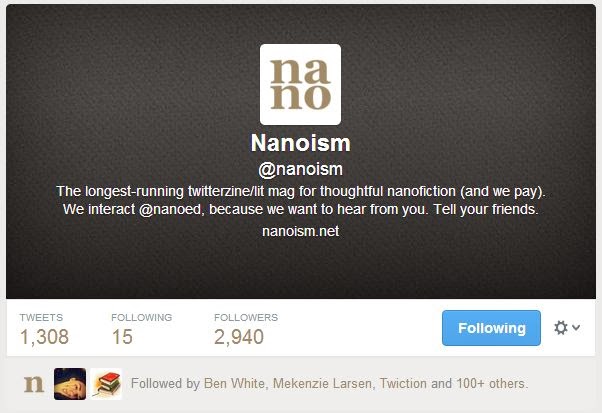I decided to write a quick blog entry after reading an article in The Millions by Elizabeth Minkel entitled, "Can #TwitterFiction Transcend Gimmickry and Become Art?" which has the obvious implication that current fiction on Twitter has not, and maybe cannot, become worthy of the title, "art."
As I read her article, I learned of the Twitter Fiction Festival that is currently going on now through this Sunday, March 16th. I thought she was covering the gist of Twitter fiction pretty well - the obligatory Jonathan Franzen anti-Twitter quote, a couple of short stories by well-known authors that used Twitter as the medium, and even tracing origins in the Japanese cell-phone novel. However, there still seemed to be a huge piece of the puzzle missing.
The Twitter Fiction Festival 2014
I had vaguely stumbled upon the Twitter Fiction Festival at some point last month and forgotten about it, but this is the first I heard of it even though it started in 2012. As I looked into it, I started to wonder if Minkel's accusations of gimmickry stemmed from the nature of this festival. For example, look at what we are greeted with on their "About" page:While I agree with them "That means perhaps something more than just tweeting out a narrative line-by-line," the first item in their example list is "Parody Accounts." If we're talking about fiction on Twitter, it seems to me that the foremost use of the word is not in the sense of "fictitious," but in the sense of a narrative story. Yet as you can see, not only is "Narrative" crammed in slot four of five, it is also combined with the other genre I would expect to be of utmost importance if we're going to talk about writing as art: Poetry. I understand that the interplay between when something so short becomes defined as a poem or a story is part of what's interesting in using Twitter as a medium for creative writing, but I've read guidelines of Twitter literary journals that distinctly indicate they are only publishing stories with character and plot, not poetry. What's that? Twitter literary journals?
Twitter Literary Journals - As in, Literary Journals That Publish Exclusively on Twitter
Something that was absent from all of the conversation I read about the Twitter Fiction Festival was the mention of literary journals that use Twitter as their medium. I still intend to dig a little deeper, but as far as I can tell, the existence of these literary journals has been entirely ignored, when I would expect the exact opposite to happen in the case of a big name festival on Twitter. The Twitter Fiction Festival is backed by the corporation of Twitter itself as well as Penguin Random House and the Association of American Publishers, and they didn't seem to invite any of the literary journals that are actually publishing quality fiction on a daily basis....or maybe not. While I didn't see anything on their website or the news coverage of the festival, I did find this tweet when I was checking into Nanoism:
[ Check back tomorrow for a very exciting #twitterfiction festival announcement! ]
— Nanoism (@nanoism) March 12, 2014
So maybe they are included, which would be fantastic. Maybe the festival can provide some exposure to the Twitter microfiction community. I was most active in those circles back in 2009-2010, and as tends to be the case with the lifespans of small literary journals as a whole, a lot of the journals from that time are now defunct. However, I can't find a comprehensive list of Twitter literary journals, so that might be a project for another blog post.Narrative Art in 140 Characters or Less
To go back to the concept of Twitter fiction as art, I think where the medium really shines is in the creation of a complete story in one tweet. To use Nanoism as an example, their guidelines read:"Nanoism is a twitterzine, an online publication focused on nanofiction, which in this case refers to stories that clock in at a maximum of 140 characters...
we
are most interested in literary fiction—stories that move us with their
writing. We are looking for staying power: pieces that leave an impression
disproportionate to their length."
A well crafted piece of Twitter fiction is a cousin of the haiku. The minimalist restrictions imposed upon it may be arbitrary, but they force the writer to do the delicate work of distilling a story down to its barest essence. Other types of fiction on Twitter that work via serialization of multiple tweets or utilization of different accounts may still achieve the status of art, but they're a different breed than the single-tweet story, more in the same vein as an epistolary novel than a haiku.
Microfiction and Twitter: More to Come
I've been intending to write a post on the art of microfiction and highlight the writing of Daniil Kharms, the undisputed master of the shortest stories (according to me, at least), so this is a topic that I'll be returning to in the future with more depth.
In the mean time, I'd love to hear your thoughts on Twitter Fiction and what you think of the Twitter Fiction Festival.
--------------------
Related
Posts:
.jpg)





